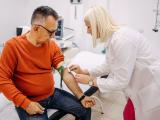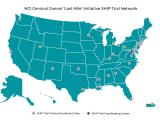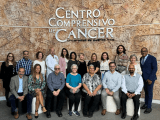Latest News, Upcoming Events, In Case you Missed It, Reminders
POSTED: 3/12/2024
SOURCE: DCP Updates
Upcoming Event, Notice of Funding Opportunity (NOFO): Palliative Care, Reminder
POSTED: 2/28/2024
SOURCE: DCP Updates
Latest News, Upcoming Events
POSTED: 2/21/2024
SOURCE: DCP Updates

The National Institutes of Health (NIH) has launched a clinical trials network to evaluate emerging technologies for cancer screening. The Cancer Screening Research Network (CSRN) will support the Biden-Harris administration… Learn more
POSTED: 2/21/2024
SOURCE: NCI Press Release

The 2024 AACR Distinguished Public Service Award will be given posthumously to NCI cancer researcher Worta McCaskill-Stevens, M.D., at the AACR Annual Meeting 2024, to be held from April 5-10 at the San Diego Convention… Learn more
POSTED: 2/19/2024
SOURCE: AACR News Release
Latest News, Upcoming Events, Notice of Funding Opportunities (NOFOs): Assay Validation for Studies in Cancer, Reminders
POSTED: 2/6/2024
SOURCE: DCP Updates

Findings from two studies aimed at learning more about preventing the type of esophageal cancer with the fastest growing incidence rate have emerged recently from the Barrett’s Esophagus Translational Research Network (… Learn more
POSTED: 1/30/2024
SOURCE: Cancer Prevention Science Blog

Staff Highlight, DMACC Updates, Research Funding Opportunities, Active and DCP-Approved Studies, Upcoming Events
POSTED: 1/30/2024
SOURCE: DCP News

Cancer screening tests can help doctors find several forms of the disease at an early stage. The US Preventive Services Task Force (USPSTF) recommends routine screening for breast, cervical, colorectal, and lung cancer. But… Learn more
POSTED: 1/26/2024
SOURCE: NCI Cancer Currents Blog

On January 25, 2024, the National Cancer Institute (NCI), part of the National Institutes of Health, with public and private partners, is launching a new clinical trial network to gather data on a “self-collection” method of… Learn more
POSTED: 1/25/2024
SOURCE: Cancer Prevention Science Blog
Latest News, Upcoming Events
POSTED: 1/24/2024
SOURCE: DCP Updates
Latest News, Upcoming Event, Notice of Funding Opportunities (NOFO): Cancer Prevention and Control, Reminder, In case you missed it
POSTED: 1/3/2024
SOURCE: DCP Updates

Screening tests like mammography and low-dose CT scans can catch cancers early only when people with abnormal results return for the necessary follow-up testing. But many people with abnormal results don’t get this… Learn more
POSTED: 12/22/2023
SOURCE: NCI Cancer Currents Blog

In this issue we present: the 2023 ULACNet and CAMPO Meetings in San Juan, PR, the long and winding journey in ROCCHHA, the ULACNet-302 site visit, and the New and Improved UNITED webpage.
POSTED: 12/18/2023
SOURCE: DCP News

There are many approved medications for reducing breast cancer risk, but they can cause toxic side effects that lead people to forego preventive interventions. Two recent NCI-supported studies looked at ways to provide… Learn more
POSTED: 12/15/2023
SOURCE: Cancer Prevention Science Blog
Latest News, Upcoming Events, Notice of Funding Opportunities (NOFOs): Cancer Prevention and Control and More
POSTED: 12/5/2023
SOURCE: DCP Updates

The National Cancer Institute (NCI) Division of Cancer Prevention (DCP) is pleased to announce the inaugural cohort of the DCP Early Career Scientist Spotlight Research Seminar Series. The new series of public seminars will… Learn more
POSTED: 12/1/2023
SOURCE: DCP News

Worta McCaskill-Stevens, M.D., a medical oncologist, former director of the NCI Community Oncology Research Program (NCORP), and a tireless champion of addressing cancer disparities, passed away peacefully on November 15,… Learn more
POSTED: 11/17/2023
SOURCE: DCP News
Latest News, Upcoming Event, Notice of Funding Opportunities (NOFOs): Cancer Early Detection Research
POSTED: 11/7/2023
SOURCE: DCP Updates

Nationwide Effort Begins to Find Permanent Leader
Brandy Heckman-Stoddard, Ph.D., M.P.H., Chief of the National Cancer Institute (NCI) Division of Cancer Prevention (DCP) Breast and Gynecologic Cancer Research Group (… Learn more
Brandy Heckman-Stoddard, Ph.D., M.P.H., Chief of the National Cancer Institute (NCI) Division of Cancer Prevention (DCP) Breast and Gynecologic Cancer Research Group (… Learn more
POSTED: 11/1/2023
SOURCE: DCP News

It is not known whether, and to what extent, the benefits of screening with MCD assays will outweigh the harms for the population in which these assays would be used. To address these evidence gaps, NCI, part of the National… Learn more
POSTED: 11/1/2023
SOURCE: ASCO Daily News

Getting a diagnosis and undergoing treatment for a serious illness like cancer rank as some of life’s most stressful experiences. Over the last decade, it’s been increasingly recognized that distress can have an impact on a… Learn more
POSTED: 10/27/2023
SOURCE: NCI Cancer Currents Blog

A healthier diet has been associated with reduced risk of cancer, but the mechanisms of how that actually works continue to be investigated. In two recent studies, researchers are looking to understand the process on a… Learn more
POSTED: 10/25/2023
SOURCE: Cancer Prevention Science Blog
DCP Updates: Latest News, Notice of Funding Opportunities (NOFOs): Pre-Cancer Atlas Research Centers and More
POSTED: 10/17/2023
SOURCE: DCP Updates
Cancer-screening tests that can detect multiple cancer types, or multi-cancer early detection (MCED) tests, have emerged recently as a potential new tool in decreasing cancer morbidity and mortality. Most MCED assays are… Learn more
POSTED: 10/4/2023
SOURCE: Clinical Chemistry

